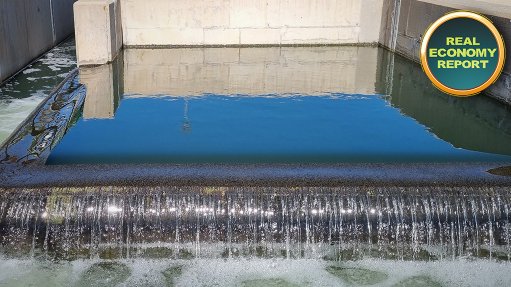
From Creamer Media in Johannesburg, this is the Real Economy Report.
Sashnee Moodley:
Metropolitan water utility Joburg Water has announced it will expand the capacity of the Driefontein wastewater treatment plant, in Krugersdorp, from 55 Ml to 80 Ml to account for a growing population and increasing amounts of stormwater flowing into the plant. Marleny Arnoldi visited the site.
Marleny Arnoldi:
The Driefontein plant currently collects and treats 42 Ml of sewage a day, which is 75% of the nameplate capacity.
Driefontein wastewater treatment works manager Jacqueline Ngwenya says the plant has been expanded various times since the initial 15 Ml plant was commissioned in the 1970s, however, the expansion to 80 Ml will be the last, since the plant is surrounded by residential areas and will have reached its maximum expansion potential.
The expansion project will start in the next year or two, and will take about four years to complete in its entirety.
Ngwenya says the timeline depends on fund availability.
The Driefontein plant is one of six Joburg Water wastewater treatment plants and treats the sewage from Roodepoort and some areas of Mogale City, including Muldersdrift, Magaliesburg, Kagiso and Krugersdorp.
It currently serves about 100 000 people.
Ngwenya unpacks the wastewater treatment process and how the plant uses smart online monitoring technology to detect possible faults or failures across the plant.
Driefontein wastewater treatment works manager Jacqueline Ngwenya...
Marleny Arnoldi:
The plant has consistently exceeded the targeted effluent compliance rate of 90% set by the Department of Water and Sanitation for Green Drop water, by averaging an effluent compliance rate of 98%.
Ngwenya says it is important for clean water to be put back into the environment to prevent water-borne diseases and limit pollution.
The effluent compliance rate of the plant drops to about 95% in times of loadshedding, since it has to release partially treated water in these instances.
Ngwenya assures, however, that the resulting effluent is still clean, just not chemically treated. With the amount of sewage and stormwater that continuously flows into the plant, it is impossible to “pause” the plant during loadshedding. Rather, Driefontein prioritises the critical treatment processes that need to keep running, and reduces the risk of damage to equipment owing to severe overflows.
The plant runs on backup diesel generators when necessary, however, it has a biogas plant constructed with pending commissioning. Another Joburg Water operation in Diepsloot has a biogas plant, which ran from November 2012 to December 2019 at only 20% capacity.
Ngwenya explains the outstanding elements to the Driefontein biogas plant’s commissioning.
Driefontein wastewater treatment works manager Jacqueline Ngwenya..
Sashnee Moodley:
That’s Creamer Media’s Real Economy Report. Join us again next week for more news and insight into South Africa’s real economy. Don’t forget to listen to the audio version of our Engineering News daily email newsletter.